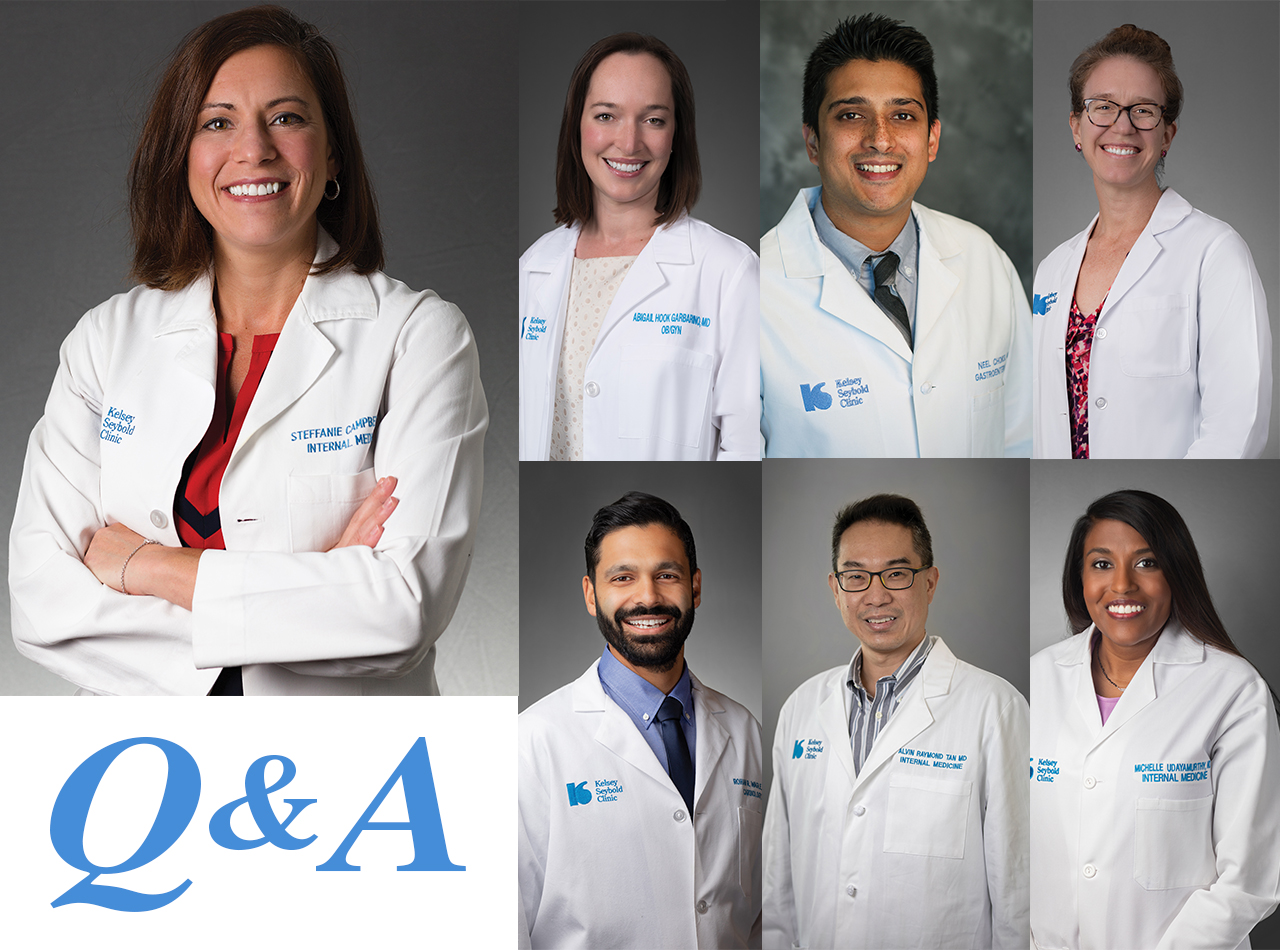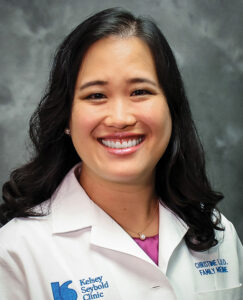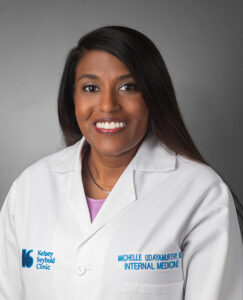Ask the Doctors
July 28, 2023

 Steffanie Campbell, M.D., F.A.C.P
Steffanie Campbell, M.D., F.A.C.P
Internal Medicine, Kelsey-Seybold Pearland Clinic
- How often should an adult be visiting their primary care doctor?
- A young healthy individual under 50 should visit their PCP every 3 years. It is recommended that individuals over the age of 50 visit their PCP yearly. If you have chronic medical conditions at any age, a yearly physical is needed in addition to regular follow-up visits as determined by the condition and its control.
Bio: Steffanie Campbell, MD, FACP | Pearland Internal Medicine | Kelsey-Seybold
 Christine Le, D.O.
Christine Le, D.O.
Family Medicine, Kelsey-Seybold Memorial Villages Campus
- In your 30s, what is your PCP routinely checking for?
- It’s important to know your numbers! Usually, we check for blood pressure, heart rate, breathing rate, weight, height, and body mass index. These basic numbers may give helpful clues to determine if a person is within a heathy range. For example, blood pressure that is 130/80 or less is considered in the normal range. Another example, a body mass of 30 and above may indicate that a patient is in the obese range. We also monitor for stress and may offer questionnaires that check on depression and or anxiety.
- What are some of the tests they may run?
- Getting some baseline testing is helpful. This may include a test for diabetes and lipids. Sometimes diabetes and lipids may be due to less healthy eating habits and less physical activity, but for some people, there may be a hereditary component. Sometimes, if a woman has fatigue or menstruation changes, it is recommended to check for anemia and thyroid hormone. Pap smears are additional wellness tests for women that are completed to check on cervical health. Sexual health screenings may also be offered.
- What are some of the age-related screenings that you may do?
- Diabetes screening is recommended for patients starting at age 35 who are overweight or have obesity.
Lipid screening is recommended for patients starting at age 20 if they have risk factors.
HIV screening is offered to anyone age 15 and up or who may have an increased risk of infection.
Hepatitis C screening is offered to anyone age 18 and above. - What are some of the recommended vaccines for this age group?
- Flu shot is recommended each season to prevent the flu.
Tdap vaccine is recommended every 10 years to prevent infections from wounds and to prevent the whooping cough.
Pneumovax 20 is recommended for smokers to prevent lung infections.
Hepatitis B vaccines are offered to patients age 19 and up. This prevents liver inflammation and liver cancer.
HPV vaccines are offered to anyone age 9 –45. This prevents abnormal cells and cancers.
Covid-19 boosters are recommended for anyone age 6 months and up.
Bio: Christine Le, DO | Family Medicine Doctor | Kelsey-Seybold
 Amelia Averyt, M.D., M.P.H.
Amelia Averyt, M.D., M.P.H.
Pediatrics and Internal Medicine, Berthelsen Main Campus
- In your 40s, what is your PCP routinely checking for?
- In your 40s, your PCP will routinely be checking for certain conditions in your mental and physical health that can impact your wellbeing in the short and long-term. They will likely evaluate you for mental health issues such as stress, trouble sleeping, depression and anxiety. They will check vital signs to make sure your blood pressure and heart rate are within normal range. They will do a thorough physical exam to make sure everything head-to-toe is working well. They will also likely look for chronic medical conditions including issues with the blood sugar, cholesterol, liver, and kidneys. They may also do tests for certain chronic infections like hepatitis and HIV. It is important that you come prepared for these visits with a list of your past medical and surgical history, your family history, and any current medical conditions you are being treated for. Bring a list of any medications, supplements, or vitamins you are taking. And most importantly, make sure to bring your questions! Your PCP may change the tests they run based on symptoms you have, and most importantly, you should have your concerns addressed!
- What are some of the tests they may run?
- Your PCP will likely order blood work and possibly urine studies. Lab work may check blood sugar and cholesterol levels and may also look for problems with other organs such as kidney and liver. If your symptoms suggest problems with other systems, they may also look for things like anemia and thyroid. It is important to ask what tests they will run to make sure that all your concerns are being addressed.
- What are some of the age-related screenings that you may do?
- In your 40s, the age-related screening has to do with what organs you have. Breast cancer screening is recommended now for everyone starting at the age of 40 -45 years old. Colon cancer screening is recommended starting at an age of 45 years. And it is recommended to undergo cervical cancer screening if you have a cervix with a PAP smear at regular intervals based on your previous PAP results and certain risk factors. If you have any other cancer concerns, including a family history of cancers, please let your PCP know!
- What are some of the recommended vaccines for this age group?
- We recommend an annual flu shot for everyone, as well as a discussion with your PCP about COVID-19 boosters. A tetanus vaccine booster is recommended every 10 years. Based on certain other medical conditions like chronic lung, liver, or kidney disease or diabetes, you may be advised to receive other vaccines against pneumonia or hepatitis to help keep you safe and healthy!
Bio: Amelia Averyt, MD, MPH | Internal Medicine/Pediatrics | Kelsey-Seybold
 Sebastian Scobercea, M.D.
Sebastian Scobercea, M.D.
Family Medicine, Kelsey-Seybold Clinic – Kingwood
- In your 50s, what is your PCP routinely checking for?
- During an annual visit, a PCP will review a patient’s medical history and perform a physical exam. The PCP may also collect information about the patient’s family medical history, which may lead to other specific testing and screening recommendations. Routine labs for patients over age 50 include cholesterol panel, blood sugar, electrolytes, kidney and liver function tests.
- What are some of the tests they may run?
- For some patients 50 and older, an EKG is done to screen for heart disease. Also, a chest CT scan may be recommended for patients with a long history of smoking to screen for lung cancer.
- What are some of the age-related screenings that you may do?
- Depending on age, we may screen for breast cancer and cervical cancer in women, and for prostate cancer in men. Colonoscopies or ColoGuard testing can be done to screen for colon cancer in both men and women.
- What are some of the recommended vaccines for this age group?
- Two Shingles vaccines are recommended after age 50.
- Two Pneumonia vaccines are recommended for patients at age 65, sooner in high risk patients who may have asthma, COPD, diabetes, etc.
- Tetanus boosters are recommended every ten years
- Yearly influenza vaccines are recommended in the fall.
Bio: Sebastian Scobercea, MD | Kingwood Family Medicine | Kelsey-Seybold
 Michelle Udayamurthy, M.D.
Michelle Udayamurthy, M.D.
Internal Medicine, Kelsey-Seybold Berthelsen Main Campus
- In your 60s, what is your PCP routinely checking for?
- Typically, in your 60s you get your blood pressure screening to ensure that you do not have high blood pressure. You also get your cholesterol screened which is a good indicator of your overall cardiac health. An individual’s weight is also reviewed.
- In your 60s, what are some of the tests they may run?
- Typically, you get screened for diabetes. You also get your lipids checked. In addition, physicals may include a blood pressure check and a weight check. Depending on your other health conditions additional testing with labs may be done. For men we typically do PSA testing during this age range.
- What are some of the age-related screenings that you may do?
- Mammograms, colonoscopy, Pap smear, vision screening, PSA testing.
- What are some of the recommended vaccines for this age group?
- TDaP, zoster, Covid, flu, pneumonia (depending on if you have other medical conditions)
Bio: Michelle Udayamurthy, MD | Houston Internal Medicine Doctor | Kelsey-Seybold Clinic
 Alvin Raymond Tan, M.D.
Alvin Raymond Tan, M.D.
Internal Medicine, Kelsey-Seybold Clinic – West University
- In your 70s+, what are some tests your PCP may run?
- If you are 70 and older, your PCP may offer blood tests to check for liver health, kidney health, electrolytes, TSH (thyroid health), sugar/HBA1C (diabetes), cholesterol, and blood count for anemia, as well as a urine test to check for UTI/blood in the urine routinely. We check blood pressure and do a physical exam to check for any abnormalities. We will request for other tests like PSA (prostate cancer test), immunity status testing for Hepatitis C, and others on a case-to-case basis.
- What are some of the age-related screenings that they may do?
- For patients who are 70 and older, your PCP may recommend seeing the Optometrist for glaucoma screening and vision check, mammogram to check for breast cancer, and colonoscopy for colon cancer screening. Other screening tests we recommend are bone density test for osteoporosis and CT scan of the chest for lung cancer screening for active and former smokers. Your PCP may also would recommend OB/GYN follow ups for cervical cancer screening in age-appropriate patients.
- What are some of the recommended vaccines for this age group?
- An annual flu shot, updated COVID shots and boosters (the bivalent shot), updated Pneumococcal (pneumonia) vaccine, Shingles vaccine, and the TDAP (tetanus vaccine).
Bio: Alvin Raymond Tan, MD | Internal Medicine | Kelsey-Seybold
 Neel Choksi, M.D.
Neel Choksi, M.D.
Gastroenterology, Kelsey-Seybold Clinic – Pearland and Spencer R. Berthelsen Main Campus and Pearland Clinic
- What are three main symptoms that may prompt a colon screening?
- The three main symptoms that should prompt immediate evaluation for colon cancer include the following: bright red blood per rectum or blood mixed in with stools, unintentional weight loss, and change in stool caliber (thinner caliber stools or ribbon-like stools).Even in the absence of these symptoms, all adults over age 45 (earlier depending on family history) should undergo some form of routine colon cancer screening either with a colonoscopy, a CT colonoscopy, or stool-based tests like Cologuard or FIT testing.
Bio: Neel Choksi, MD | Houston Gastroenterology | Kelsey-Seybold Clinic
 Desiree Thomas, M.D.
Desiree Thomas, M.D.
Neurology, Kelsey-Seybold Clinic – Spencer R. Berthelsen Main Campus and Fort Bend Medical and Diagnostic Center
- Please name a few neuro symptoms that would commonly trigger a screening test?
- Memory loss – if a patient is having significant memory loss, an in-office brief questionnaire is administered. Based on the results a more formal referral for a 3-4 hour neuropsychological test may be warranted. Genetic testing is usually not recommended. Family history of cerebral aneurysm – If a patient has at least two first degree relatives with aneurysms, a CT or MRI can screen for aneurysms is recommended for the patient. The same test is also recommended for new onset sexual headaches. Neuropathy – If blood work doesn’t reveal a cause for numbness/weakness, an EMG/nerve conduction test may be performed to evaluate the patient’s symptoms. Double vision/eyelid weakness – this could be a sign of a condition called myasthenia gravis prompting screening blood work for antibodies.
Bio: Desiree Thomas, MD | Houston Neurologist | Kelsey-Seybold Clinic
 Rohan Wagle, M.D., F.A.C.C
Rohan Wagle, M.D., F.A.C.C
Cardiology, Kelsey-Seybold Clinic – Memorial City and Memorial Villages Campus
- What are 3 cardiology symptoms that would commonly trigger a screening test?
- Three common symptoms that could represent underlying heart disease include chest pain, shortness of breath, and palpitations. The heart is akin to a car engine, and these symptoms may represent diseases of the pump function, fuel lines, or electrical system of the heart. Having one of these symptoms could prompt your cardiologist to recommend a screening test to further investigate whether these symptoms are due to heart disease.
Bio: Rohan Wagle, MD, FACC | Houston Cardiologist | Kelsey-Seybold Clinic
 Abigail Garbarino, M.D.
Abigail Garbarino, M.D.
OB/GYN, Kelsey-Seybold Clinic – Woman’s Center and Downtown Clinic
- Please name 3 gyno symptoms that would trigger a screening test?
- The first is postcoital bleeding/spotting (bleeding or spotting after intercourse). Although there are many benign causes of this, it is important to evaluate for cervical cancer (with a pap test) and sexually transmitted diseases such as gonorrhea, chlamydia, or trichomonas (with a vaginal swab or urine sample). The second is periods that are so heavy or painful that you are missing work or school: many women are told that this is just a “normal” part of life. However, bleeding so heavily that you are anemic or have trouble leaving the house can be a reason to evaluate for several things including bleeding disorder called Von Willebrand disease, endometrial cancer (in the setting of certain risk factors), or uterine or cervical polyps or fibroids. There are also treatments which can dramatically improve your quality of life so don’t suffer in silence!The third is regularly going more than 35 days between periods (first day of bleeding to first day of bleeding). This is a sign that you are most likely not ovulating – which can be a sign of other health problems including PCOS. If you are not on any hormonal birth control medication that is affecting your cycle and are still skipping periods, this increases your risk of endometrial (uterine) cancer and should be addressed with an OB/GYN.
What's Your Reaction?
Excited
0
Happy
0
In Love
0
Not Sure
0
Silly
0






















 Christine Le, D.O.
Christine Le, D.O. Amelia Averyt, M.D., M.P.H.
Amelia Averyt, M.D., M.P.H. Sebastian Scobercea, M.D.
Sebastian Scobercea, M.D. Michelle Udayamurthy, M.D.
Michelle Udayamurthy, M.D. Alvin Raymond Tan, M.D.
Alvin Raymond Tan, M.D. Neel Choksi
Neel Choksi
 Desiree Thomas, M.D.
Desiree Thomas, M.D. Rohan Wagle, M.D., F.A.C.C
Rohan Wagle, M.D., F.A.C.C Abigail Garbarino, M.D.
Abigail Garbarino, M.D.